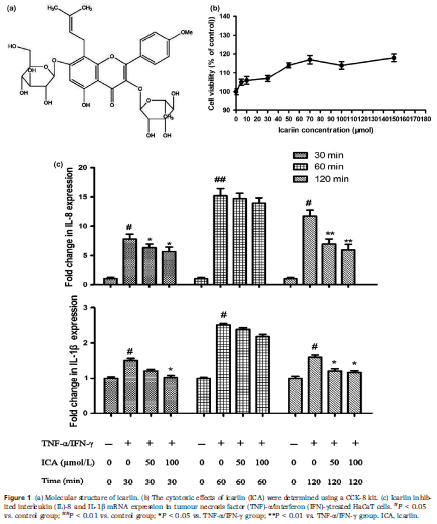Icariin inhibits inflammation via immunomodulation of the cutaneous hypothalamus–pituitary–adrenal axis in vitro
L. Kong#, X. Liang#, A. Liu, X. Yang, Q. Luo, Y. Lv and J. Dong*
Clinical and Experimental Dermatology (Clin Exp Dermatol). 2018 Aug 28. IF: 1.484
Summary
Background
Dysfunction of skin steroidogenesis plays an important role in inflammatory skin diseases. We previously carried out an animal study which showed that icariin could inhibit the inflammation of atopic dermatitis by regulating the cutaneous hypothalamus–pituitary–adrenal axis (HPAA).
Aim
To explore the immunomodulation of icariin on cutaneous HPAA by detecting the response to the inflammatory cytokines tumour necrosis factor‐α/interferon‐γ in HaCaT cells.
Methods
Cortisol level and the steroidogenesis‐regulating enzymes CYP11A1 and CYP11B1 were measured to evaluate the level of skin steroidogenesis. In addition, the therapeutic effects of blocking CRH‐R1 by the CRH‐R1 inhibitor antalarmin and blocking the CRH‐R1/2 signal pathway by the nonspecific CRH receptor antagonist astressin were observed.
Results
Unexpectedly, we found that icariin treatment blocked the secretion of the inflammatory cytokines and prevented initiation of steroidogenesis; however, prolonged treatment with icariin significantly increased steroidogenesis in HaCaT cells. The promoting effect of icariin on steroidogenesis was not dependent on the CRH‐R1 pathway.
Conclusion
Icariin has a regulatory effect on steroidogenesis in HaCaT cells, which may provide a promising therapeutic target for the treatment of inflammatory skin disorders.



